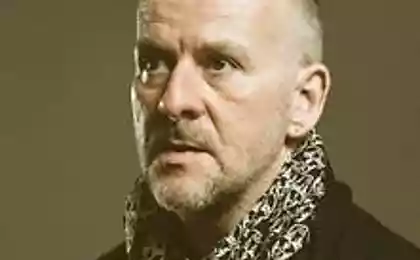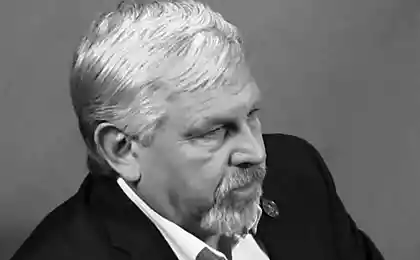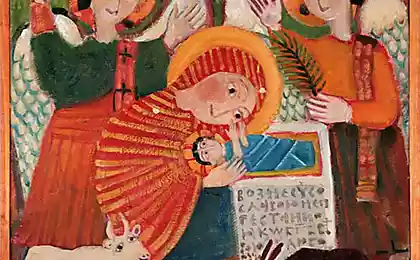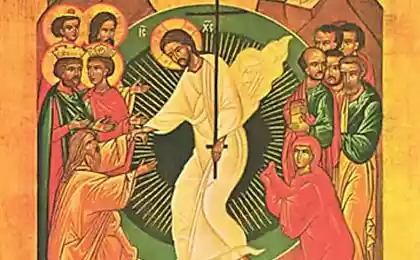751
Why Christ died
These days, when we remember the suffering of our Lord salvation, it is important to think about how our salvation is connected with Its acts. For many, this question remains unclear – as it has been outstanding for me.
After I appealed and was Baptized, took years until I understood why Christ died and what does this have to do with me personally. That is, of course, I knew that Christ was killed for us, and could repeat the creed, being woken in the night, and, of course, read many times and heard the phrase "Christ died for our sins according to the Scriptures", but I would not be able to answer the question: "And how it relates to my own hope?»
The way of salvation – as I saw it – looked like this: I behaved badly, ignored commandments, and did not want to know no will of God, but now I became a good Christian, shying away from the most flagrant forms of immorality, go to Church, and before God it will gain me an excuse.
Twenty one million four hundred sixty two thousand six hundred eighteen
Efforts to live right as a Christian ought to be extremely useful, primarily because they lead to the realization of the impossibility to live like that. Does not work. I obviously do not pass the standard "ready for heaven".
Attempts to lead his life in accordance with God's law lead to the fact that you find that, first, do not live under the law, and secondly, can not, and thirdly – don't want to.
You can attempt, like those ancient Israelites, to proclaim: "All that the Lord hath said will we do, and be obedient" (ex. 24:7), "but then nature will still take its course" as they say in the joke.
In fact, our fallen nature seeks self-assertion and domination, seeking to dispose of the world, other people and even God according to his will, to put himself exactly in the center. When I read in a Christian book that Christians need to put first God, then the middle, and on the last page, I realized that this is exactly what I don't want to do. This is what causes violent internal protest.
Religion as such does not change anything in this sinful will to power, it just gives her a new arena of activity. The criticism of religion, which comes from Nietzsche and Marx that religion is the instrument of power of some people over others – is based on reality, and is responsible for only a too narrow view of things. For the fallen man everything – religion, atheism, science, politics, art turns into an instrument of power over others. To get rid of religion, as shown by the Soviet and Chinese experience, but this does not change the human propensity to suppress his neighbor. On the contrary, this suppression is even more brutal forms.
Turning to religion, can become, as Christ warns, "son of hell", attributing their human passions, supernatural excuse.Human religion's dripping with sin, like all human.
In the gospel takes too much space it is the conflict between Christ and the Pharisees – as people, of course, deeply religious. People who had made a huge effort to be with God in good standing – and which, in the end, ahead of the publicans and the harlots. Because of the fallen nature taking its course – one begins to ascribe special religious status, then suppress and haughty (it happens involuntarily, like the hand of a drunkard reaches for the bottle), then any doubts as to his special status, begin to be perceived as undermining the true faith.
There is a rough army joke: "And remember: everything you do is wrong." Alas, this is true in respect of our fallen nature – the sin poisons all our impulses, especially those which seem most worthy, noble and pious. People can say all the required humble self-accusation, and at the same time to revel in pride and contempt.
Even the desire to seek God's approval very quickly turns out to be poisoned by pride – a man seeking to exalt himself, not God, and despise those who please God wrong.
To overcome his sinfulness as impossible as to pull itself out of the swamp by the hair. It's hopeless.
And here the gospel is proclaimed in the background of this hopelessness. Usually when people talk about "the gospel", they mean "book that contains the teachings of Jesus about how to live". Outside, non-believers or followers of non-Christian religions – the gospel is perceived as a collection of instructions that Jesus gave to mankind, like other great teachers.
There are a number of religious texts that speak about how to behave, to acquire the favor of God and the gospel is put in this series. But if we turn to the New Testament, we discover that we are out there talking about something else. First, the gospel is the proclamation, not the text. Secondly, this proclamation is not about what we must do for God but about what God has done for us.
Instruction in the gospel, of course, and they are very important – although not unique. There are Parallels in the old Testament, and beyond the biblical world. People have always understood that fraternal cooperation is better than rivalry, forgiveness better than revenge, and humility is better than pride. The trouble is that they themselves were not so; we cannot say that counsel of the sages did not make sense in some deterrent effect they had – but they could not heal the man and to reconcile him with God.
The catastrophe of the fall plunged the human race into a situation internal divisions – on the one hand, we know and can not know how to do the right thing. We'd all like to live in a world where people do the right thing. It would be almost Paradise. But we're not able – or even want – to do themselves.
You can read the wolf of lectures on the sublime nature of vegetarianism; it can even be moved to drop a tear avaricious wolf. But he will not cease to be a wolf. Religious visionaries or philosophers can say quite the right words – but that's all the instructions for extricating themselves from the swamp by the hair, they don't work.
And here in the person of Jesus Christ comes to the world of God. But not only God the Lord Jesus, as the Church teaches, has two natures – He is fully God and fully man. And now, as man He was sinless. He, unlike us, does not seek to establish Himself, trampling on others. He perfectly obeys the Father and humbly follow His will. He comes to serve. "For the Son of man did not come to be served, but to serve, and to give His life a ransom for many" (MK. 10:45)
There is one Person who is absolutely sinless and righteous is Jesus Christ. He, alone of all the human race, justified, exalted and glorified is fully deserved. Other people can be righteous relatively – in the sense that they're better than their surroundings. Jesus is the only – absolutely righteous, before God. The resurrection shows that everything He said and did, bears the stamp of God's approval.
The Scripture says that Christ is "not ashamed to call us brethren" (Heb. 2:11), He voluntarily identifies Himself with sinners, so that bears our sins and justifies us with His righteousness. St. John Chrysostom says: "As a phenomenon of wealth is to not only to be rich, but others to do the rich, the phenomenon of life – is to not only to be alive, but dead to revive, and the phenomenon of force – in order not only to be strong but also to strengthen the weak, and the phenomenon of truth is to not only to be righteous, but others decayed in sins, instantly just. Izyaschnaya it, (the Apostle) and he revealed what it means to the phenomenon, saying: “but [will be] He might be just and justifying the believer in Jesus (ROM. 3:26)”, no doubt: you are justified not by works, but by faith. Don't avoid the same truth of God, as it is a double benefit, – and easily obtained, and offered to all".
If I deserved heaven? No, and it would be ridiculous to assume. Can I earn it in the future? No, it's hopeless. Earned Christ the right to lead me to heaven? Yes, the gospel is about. Our hope is not based on what we have done, are doing or hope to do in the future – but what you've done for us God in Jesus Christ.
How else, says St. John Chrysostom, "because we have been liberated from punishment, have souleles all evil, was born-again, resurrected after the burial of the old man has been redeemed, sanctified, given in adoption, are justified, made brothers of the only-begotten, became His joint heirs and salesname with Him, became part of His flesh and was United with Him as the body with the head.
All Paul is called an excess of grace, showing that we not only got the medicine according to our own ulcer, but also health, beauty, honor, glory and merit, which are much above our nature. Each of these gifts would in itself destroy death. And when they are flocking together, then death is exterminated with root and can not have to appear no sign of her, no shadows. It is as if someone over ten ovolo plunged some debtor of his into prison, and not only himself, but, according to his fault, and his wife, children and servants, and the other, who came, not only would those ten ovalov, but also gave ten thousand talents of gold, and brought prisoner to the king's Palace, put in the place of highest authority and would make him a member of the highest honor and other differences – then gave in loan could and remember about ten ovolo.
The same happened with us. Christ paid much more than we had to, and so much more, how the sea is boundless in comparison with the small straw. So, do not hesitate, man, seeing such a wealth of benefits, don't ask an extinguished spark of death and sin, as soon as it was poured out upon a sea of grace gifts."
Being poor, hopeless and condemned in themselves, we find the richness, firm hope and justification in Jesus Christ. Why I, as a sinner, have a solid hope for justification? Because I plead not my righteousness, but the righteousness of Jesus Christ.
There at Calvary, the Lord has done everything necessary and sufficient for our salvation.
Through faith, which manifests itself in Baptism, the Eucharist and the keeping of his commandments, we accept His gift.
Author: Sergey Khudiev
P. S. And remember, only by changing their consumption — together we change the world! ©
Join us in Facebook , Vkontakte, Odnoklassniki
Source: www.pravmir.ru/sergey-hudiev-dlya-chego-umer-hristos/
After I appealed and was Baptized, took years until I understood why Christ died and what does this have to do with me personally. That is, of course, I knew that Christ was killed for us, and could repeat the creed, being woken in the night, and, of course, read many times and heard the phrase "Christ died for our sins according to the Scriptures", but I would not be able to answer the question: "And how it relates to my own hope?»
The way of salvation – as I saw it – looked like this: I behaved badly, ignored commandments, and did not want to know no will of God, but now I became a good Christian, shying away from the most flagrant forms of immorality, go to Church, and before God it will gain me an excuse.
Twenty one million four hundred sixty two thousand six hundred eighteen
Efforts to live right as a Christian ought to be extremely useful, primarily because they lead to the realization of the impossibility to live like that. Does not work. I obviously do not pass the standard "ready for heaven".
Attempts to lead his life in accordance with God's law lead to the fact that you find that, first, do not live under the law, and secondly, can not, and thirdly – don't want to.
You can attempt, like those ancient Israelites, to proclaim: "All that the Lord hath said will we do, and be obedient" (ex. 24:7), "but then nature will still take its course" as they say in the joke.
In fact, our fallen nature seeks self-assertion and domination, seeking to dispose of the world, other people and even God according to his will, to put himself exactly in the center. When I read in a Christian book that Christians need to put first God, then the middle, and on the last page, I realized that this is exactly what I don't want to do. This is what causes violent internal protest.
Religion as such does not change anything in this sinful will to power, it just gives her a new arena of activity. The criticism of religion, which comes from Nietzsche and Marx that religion is the instrument of power of some people over others – is based on reality, and is responsible for only a too narrow view of things. For the fallen man everything – religion, atheism, science, politics, art turns into an instrument of power over others. To get rid of religion, as shown by the Soviet and Chinese experience, but this does not change the human propensity to suppress his neighbor. On the contrary, this suppression is even more brutal forms.
Turning to religion, can become, as Christ warns, "son of hell", attributing their human passions, supernatural excuse.Human religion's dripping with sin, like all human.
In the gospel takes too much space it is the conflict between Christ and the Pharisees – as people, of course, deeply religious. People who had made a huge effort to be with God in good standing – and which, in the end, ahead of the publicans and the harlots. Because of the fallen nature taking its course – one begins to ascribe special religious status, then suppress and haughty (it happens involuntarily, like the hand of a drunkard reaches for the bottle), then any doubts as to his special status, begin to be perceived as undermining the true faith.
There is a rough army joke: "And remember: everything you do is wrong." Alas, this is true in respect of our fallen nature – the sin poisons all our impulses, especially those which seem most worthy, noble and pious. People can say all the required humble self-accusation, and at the same time to revel in pride and contempt.
Even the desire to seek God's approval very quickly turns out to be poisoned by pride – a man seeking to exalt himself, not God, and despise those who please God wrong.
To overcome his sinfulness as impossible as to pull itself out of the swamp by the hair. It's hopeless.
And here the gospel is proclaimed in the background of this hopelessness. Usually when people talk about "the gospel", they mean "book that contains the teachings of Jesus about how to live". Outside, non-believers or followers of non-Christian religions – the gospel is perceived as a collection of instructions that Jesus gave to mankind, like other great teachers.
There are a number of religious texts that speak about how to behave, to acquire the favor of God and the gospel is put in this series. But if we turn to the New Testament, we discover that we are out there talking about something else. First, the gospel is the proclamation, not the text. Secondly, this proclamation is not about what we must do for God but about what God has done for us.
Instruction in the gospel, of course, and they are very important – although not unique. There are Parallels in the old Testament, and beyond the biblical world. People have always understood that fraternal cooperation is better than rivalry, forgiveness better than revenge, and humility is better than pride. The trouble is that they themselves were not so; we cannot say that counsel of the sages did not make sense in some deterrent effect they had – but they could not heal the man and to reconcile him with God.
The catastrophe of the fall plunged the human race into a situation internal divisions – on the one hand, we know and can not know how to do the right thing. We'd all like to live in a world where people do the right thing. It would be almost Paradise. But we're not able – or even want – to do themselves.
You can read the wolf of lectures on the sublime nature of vegetarianism; it can even be moved to drop a tear avaricious wolf. But he will not cease to be a wolf. Religious visionaries or philosophers can say quite the right words – but that's all the instructions for extricating themselves from the swamp by the hair, they don't work.
And here in the person of Jesus Christ comes to the world of God. But not only God the Lord Jesus, as the Church teaches, has two natures – He is fully God and fully man. And now, as man He was sinless. He, unlike us, does not seek to establish Himself, trampling on others. He perfectly obeys the Father and humbly follow His will. He comes to serve. "For the Son of man did not come to be served, but to serve, and to give His life a ransom for many" (MK. 10:45)
There is one Person who is absolutely sinless and righteous is Jesus Christ. He, alone of all the human race, justified, exalted and glorified is fully deserved. Other people can be righteous relatively – in the sense that they're better than their surroundings. Jesus is the only – absolutely righteous, before God. The resurrection shows that everything He said and did, bears the stamp of God's approval.
The Scripture says that Christ is "not ashamed to call us brethren" (Heb. 2:11), He voluntarily identifies Himself with sinners, so that bears our sins and justifies us with His righteousness. St. John Chrysostom says: "As a phenomenon of wealth is to not only to be rich, but others to do the rich, the phenomenon of life – is to not only to be alive, but dead to revive, and the phenomenon of force – in order not only to be strong but also to strengthen the weak, and the phenomenon of truth is to not only to be righteous, but others decayed in sins, instantly just. Izyaschnaya it, (the Apostle) and he revealed what it means to the phenomenon, saying: “but [will be] He might be just and justifying the believer in Jesus (ROM. 3:26)”, no doubt: you are justified not by works, but by faith. Don't avoid the same truth of God, as it is a double benefit, – and easily obtained, and offered to all".
If I deserved heaven? No, and it would be ridiculous to assume. Can I earn it in the future? No, it's hopeless. Earned Christ the right to lead me to heaven? Yes, the gospel is about. Our hope is not based on what we have done, are doing or hope to do in the future – but what you've done for us God in Jesus Christ.
How else, says St. John Chrysostom, "because we have been liberated from punishment, have souleles all evil, was born-again, resurrected after the burial of the old man has been redeemed, sanctified, given in adoption, are justified, made brothers of the only-begotten, became His joint heirs and salesname with Him, became part of His flesh and was United with Him as the body with the head.
All Paul is called an excess of grace, showing that we not only got the medicine according to our own ulcer, but also health, beauty, honor, glory and merit, which are much above our nature. Each of these gifts would in itself destroy death. And when they are flocking together, then death is exterminated with root and can not have to appear no sign of her, no shadows. It is as if someone over ten ovolo plunged some debtor of his into prison, and not only himself, but, according to his fault, and his wife, children and servants, and the other, who came, not only would those ten ovalov, but also gave ten thousand talents of gold, and brought prisoner to the king's Palace, put in the place of highest authority and would make him a member of the highest honor and other differences – then gave in loan could and remember about ten ovolo.
The same happened with us. Christ paid much more than we had to, and so much more, how the sea is boundless in comparison with the small straw. So, do not hesitate, man, seeing such a wealth of benefits, don't ask an extinguished spark of death and sin, as soon as it was poured out upon a sea of grace gifts."
Being poor, hopeless and condemned in themselves, we find the richness, firm hope and justification in Jesus Christ. Why I, as a sinner, have a solid hope for justification? Because I plead not my righteousness, but the righteousness of Jesus Christ.
There at Calvary, the Lord has done everything necessary and sufficient for our salvation.
Through faith, which manifests itself in Baptism, the Eucharist and the keeping of his commandments, we accept His gift.
Author: Sergey Khudiev
P. S. And remember, only by changing their consumption — together we change the world! ©
Join us in Facebook , Vkontakte, Odnoklassniki
Source: www.pravmir.ru/sergey-hudiev-dlya-chego-umer-hristos/
BAIC unveiled an electric supercar Arcfox-7
What prevents us from being objective: 11 cognitive biases






















